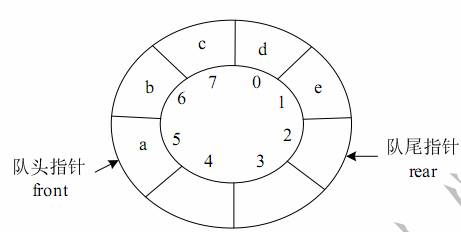循环队列
一、循环队列
在队列的顺序存储方式里,为了避免存储空间的假溢出,充分利用空间,利用另一种实现方式,即我们所说的循环队列
二、循环队列的实现
示意图

分析:
- 由于队列是有序列表,使用数组的结构来存储队列的数据时,数组的长度就是该队列的最大容量maxSize
- 由于队列的输入、输出是分首尾来处理,因此需要两个变量front和rear分别记录队列首尾端的下标。其中front会随着数据的输出而改变,而rear则会随着数据的输入而改变,但与单向队列不同的是,front和rear的初始位置指向0
- 将数据存入队列称作入队addQueue(),将数据出队列称作出队getQueue()
入队思路分析:
- 将要入队的数据存入队尾指针所指向的当前位置
- 将队尾指针向后移动一位,即(rear+1)%maxSize
注意:这里队尾指针向后移动要对最大长度取余,避免下标越界
出队思路分析:
- 将队头指针指向的当前位置的数据保存在一个临时变量中
- 将队头指针向后移动一位,即(front+1)%maxSize
注意:一样取余,避免下标越界;创建一个临时变量的原因是front后移在取值的后面
队列有效数据个数分析:
队列有效数据个数为队尾指针减去队头指针,即(rear-front+maxSize)%maxSize
条件判断:
队列为空
队头指针和队尾指针相等,即front==rear
队列满
如果队尾指针向后一位和当前的队头指针相等,则队列满,即(rear+1)%MaxSize==front
三、代码实现
package com.atguigu.queue;
import java.util.Scanner;
public class CircleArrayQueueDemo {
public static void main(String[] args) {
//测试一把
System.out.println("测试数组模拟环形队列的案例~~~");
// 创建一个环形队列
CircleArray queue = new CircleArray(4); //说明设置4, 其队列的有效数据最大是3
char key = ' '; // 接收用户输入
Scanner scanner = new Scanner(System.in);//
boolean loop = true;
// 输出一个菜单
while (loop) {
System.out.println("s(show): 显示队列");
System.out.println("e(exit): 退出程序");
System.out.println("a(add): 添加数据到队列");
System.out.println("g(get): 从队列取出数据");
System.out.println("h(head): 查看队列头的数据");
key = scanner.next().charAt(0);// 接收一个字符
switch (key) {
case 's':
queue.showQueue();
break;
case 'a':
System.out.println("输出一个数");
int value = scanner.nextInt();
queue.addQueue(value);
break;
case 'g': // 取出数据
try {
int res = queue.getQueue();
System.out.printf("取出的数据是%d
", res);
} catch (Exception e) {
// TODO: handle exception
System.out.println(e.getMessage());
}
break;
case 'h': // 查看队列头的数据
try {
int res = queue.headQueue();
System.out.printf("队列头的数据是%d
", res);
} catch (Exception e) {
// TODO: handle exception
System.out.println(e.getMessage());
}
break;
case 'e': // 退出
scanner.close();
loop = false;
break;
default:
break;
}
}
System.out.println("程序退出~~");
}
}
class CircleArray {
private int maxSize; // 表示数组的最大容量
//front 变量的含义做一个调整: front 就指向队列的第一个元素, 也就是说 arr[front] 就是队列的第一个元素
//front 的初始值 = 0
private int front;
//rear 变量的含义做一个调整:rear 指向队列的最后一个元素的后一个位置. 因为希望空出一个空间做为约定.
//rear 的初始值 = 0
private int rear; // 队列尾
private int[] arr; // 该数据用于存放数据, 模拟队列
public CircleArray(int arrMaxSize) {
maxSize = arrMaxSize;
arr = new int[maxSize];
}
// 判断队列是否满
public boolean isFull() {
return (rear + 1) % maxSize == front;
}
// 判断队列是否为空
public boolean isEmpty() {
return rear == front;
}
// 添加数据到队列
public void addQueue(int n) {
// 判断队列是否满
if (isFull()) {
System.out.println("队列满,不能加入数据~");
return;
}
//直接将数据加入
arr[rear] = n;
//将 rear 后移, 这里必须考虑取模
rear = (rear + 1) % maxSize;
}
// 获取队列的数据, 出队列
public int getQueue() {
// 判断队列是否空
if (isEmpty()) {
// 通过抛出异常
throw new RuntimeException("队列空,不能取数据");
}
// 这里需要分析出 front是指向队列的第一个元素
// 1. 先把 front 对应的值保留到一个临时变量
// 2. 将 front 后移, 考虑取模
// 3. 将临时保存的变量返回
int value = arr[front];
front = (front + 1) % maxSize;
return value;
}
// 显示队列的所有数据
public void showQueue() {
// 遍历
if (isEmpty()) {
System.out.println("队列空的,没有数据~~");
return;
}
// 思路:从front开始遍历,遍历多少个元素
// 动脑筋
for (int i = front; i < front + size() ; i++) {
System.out.printf("arr[%d]=%d
", i % maxSize, arr[i % maxSize]);
}
}
// 求出当前队列有效数据的个数
public int size() {
// rear = 2
// front = 1
// maxSize = 3
return (rear + maxSize - front) % maxSize;
}
// 显示队列的头数据, 注意不是取出数据
public int headQueue() {
// 判断
if (isEmpty()) {
throw new RuntimeException("队列空的,没有数据~~");
}
return arr[front];
}
}